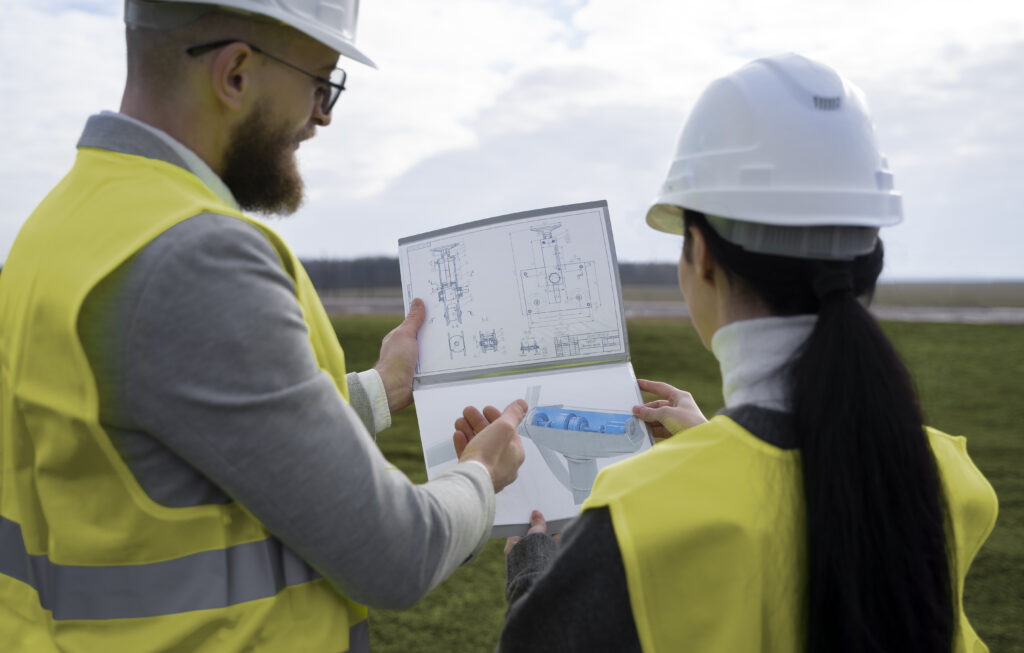The construction industry has long been a bedrock of economic development, turning visions into reality with towering skyscrapers, detail-oriented road networks, and monumental bridges. However, this sector has usually been criticized for not being up-to-date when it comes to adopting cutting-edge technology. Today, that narrative is changing. The recent technological advancements are shaking the construction industry, making it more systematic, sustainable, and resilient.
In this blog, we’ll explore how technology is reshaping construction processes and the role it plays in addressing modern challenges, particularly in Oman’s rapidly evolving landscape.

The Role of Technology in Modern-day Construction
The construction industry faces a distinct blend of challenges, including the growing demand for sustainability, efficiency, and safety. Technology has become a game-changer, tackling these challenges in the following ways:
- Improved Efficiency through Automation and Robotics
Automation and robotics have minimized manual labor in construction, leading to speedy project completion and improved accuracy. A few technology boons are named below:
- Robotic Bricklaying – Automated bricklaying machines that can lay thousands of bricks in a single day, mitigating errors and costs.
- Drones – These are used for site surveys, providing accurate measurements and real-time updates, which notably reduces project planning time.
- Sustainability in Construction Materials and Practices
With a rising importance on environmental consciousness, technology has empowered the development of varied eco-friendly materials and methods. Like:
- Recycled Materials – Hi-tech methods are now used to recycle construction waste into usable materials, contributing to a circular economy.
- Green Concrete: Innovations like self-healing and carbon-absorbing concrete help reduce the carbon footprint of construction activities.
- Enhanced Project Management with Digital Tools
Software solutions like Building Information Modeling (BIM) & Cloud Collaboration have revolutionized project management in the construction sector.
- BIM: This technology creates digital twins of construction projects, allowing stakeholders to visualize the project in 3D before construction begins. This lowers errors and optimizes resource allocation.
- Cloud Collaboration: Teams across geographies can collaborate hassle-free, making sure of real-time updates and efficient project management.
Innovations Transforming the Construction Industry
There are numerous state-of-the-art, cutting-edge technologies that are shaping the future of construction:
- Artificial Intelligence (AI) and Machine Learning
AI is being used to predict project outcomes, optimize resource usage, and improve worker safety.
- Predictive Analytics: AI can analyze past project data to predict potential delays and risks, generating proactive solutions.
- Safety Monitoring: AI-powered cameras can monitor construction sites to identify potential hazards in real-time, guaranteeing a safer work environment.
- 3D Printing
3D printing is making waves by facilitating the construction of complex structures with accuracy and efficiency.
- Custom Designs: Architects and engineers can now create intricate designs that were previously impossible or extremely expensive.
- Affordable Housing: 3D printing is being used to construct affordable housing units quickly, addressing housing shortages in many regions.
- IoT (Internet of Things)
IoT devices have helped upgrade communication and monitoring on construction sites.
- Smart Sensors: These devices track equipment usage, monitor environmental conditions, and verify compliance with safety standards.
- Connected Machinery: IoT-enabled machinery can be remotely controlled, reducing downtime and improving productivity.
- Sustainable Practices through Environmental Services
The incorporation of environmental technologies is crucial for sustainable construction practices.
- Energy-efficient Buildings: Smart building technologies promotes efficient energy consumption, reducing long-term operational costs.
- Water Management Systems: Modern water recycling systems are now fundamental to current construction projects, particularly in arid regions like Oman.
The Impact of Technology on Oman’s Construction Industry
Oman is undergoing swift urbanization and infrastructure development, driven by initiatives like Vision 2040. To meet these ambitious goals, the construction sector is embracing state-of-the-art innovative technologies to improve efficiency, sustainability, and quality.
- Sustainability in Oman’s Construction Projects – Oman’s distinctive climate makes it obligatory to follow sustainable construction practices. Technologies like solar panels, energy-efficient HVAC systems, and water recycling are becoming a standard in new projects.
- Infrastructure Development with Smart Cities – The rise of smart cities in Oman, such as Duqm and Madinat Al Irfan, emphasizes the role of technology in creating sustainable urban ecosystems. These projects integrate IoT, AI, and green building technologies to improve living standards.
- Addressing Environmental Challenges – Companies with expertise in construction and environmental services are at the forefront of adopting eco-friendly technologies. From managing construction waste to executing renewable energy solutions, the aim is to minimize environmental impact while delivering top-tier infrastructure.
Benefits of Technology Adoption in Construction
- Cost Savings – Technology lowers material wastage, labor costs, and downtime, leading to considerable savings throughout a project.
- Improved Safety – AI and IoT-powered monitoring systems help minimize accidents, creating a safer work environment.
- Quick Project Completion – Automation and advanced tools streamline processes, allowing speedy completion without compromising quality.
- Higher Quality Standards – Precision tools and AI-driven analytics guarantee that construction projects meet the highest levels of quality.
Challenges and the Way Forward
While the benefits of technology are massive, its adoption in the construction industry also has some challenges:
- High Preliminary Costs: Incorporating advanced technologies requires significant investment in the beginning.
- Skill Gaps: Training the staff to use these new technologies is a critical step in successful performance.
- Resistance to Change: Traditional practices often hamper the adoption of upgraded solutions.
Overcoming these challenges requires a collective effort from stakeholders, including government agencies, private companies, and educational institutions.

Technology is transforming the construction industry, making it more efficient, sustainable, and resilient. As Oman continues to grow at warp speed, the adoption of these innovations will be critical in meeting the country’s aspiring infrastructure goals while keeping in mind the environmental concerns.
At Khimji’s Group Oman, we believe that the future of construction is a lethal combination of technology and sustainability. By staying ahead of the curve, our goal is to contribute to Oman’s development while preserving the environment for future generations.
The future of construction is here—are you ready to build smarter, greener, and better?

